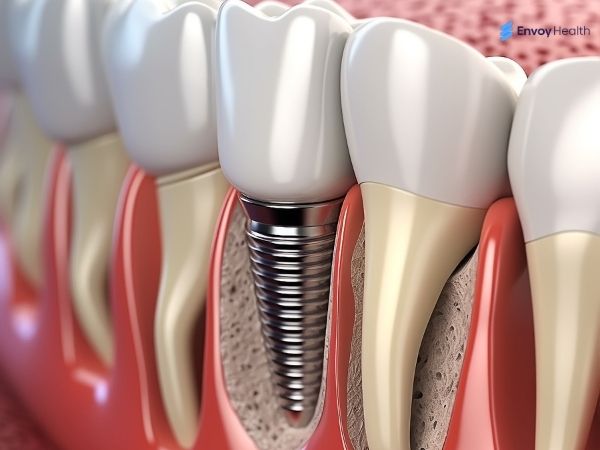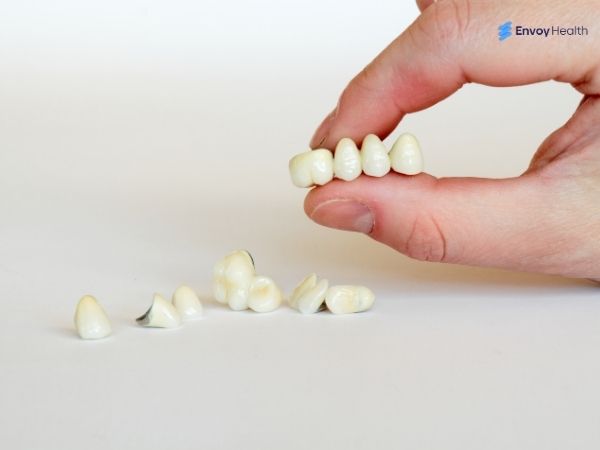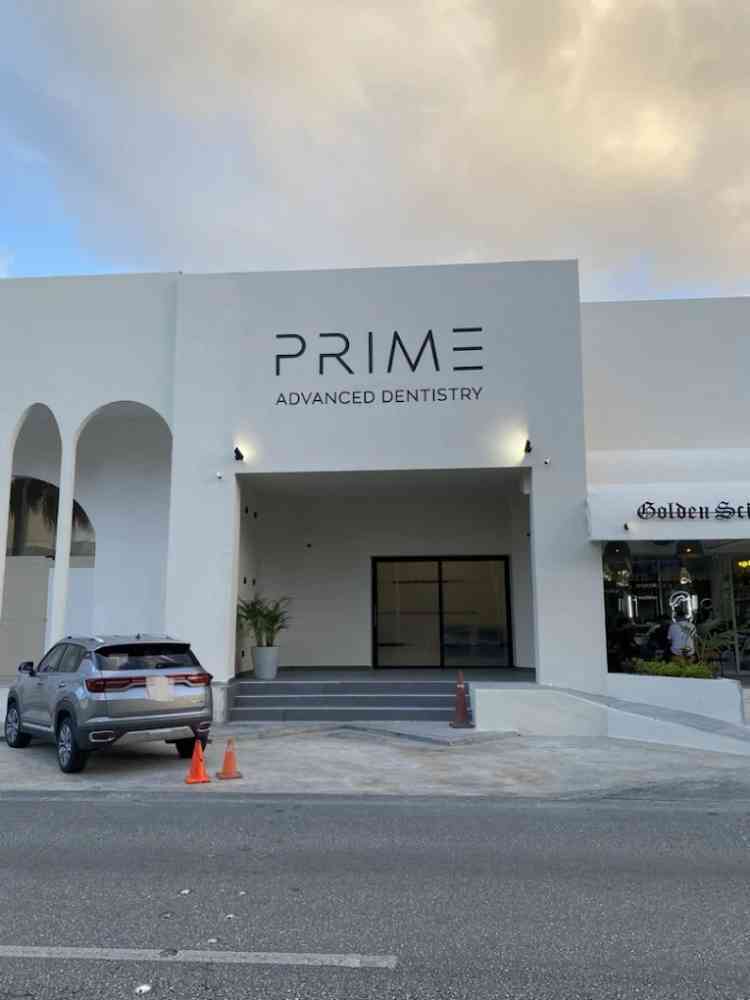Implant Tooth vs Bridge: A Complete Guide to Tooth Replacement

Prathyusha Itikarlapalli
- Content Writer

XAVIER PRIMO PAVÓN
- Reviewed by

Key Takeaways
- Implants and bridges are the top procedures for addressing missing teeth problems. The key difference between dental bridge and implant, lies in cost, technique, and invasiveness of the procedure.
- Dental implants are metal screws fixed inside the jawbone and bear artificial teeth, while bridges are two to four teeth held together in a line to cover the gaps left by missing teeth.
- Dental implants are used for single or multiple tooth loss and involve a costly, surgical procedure, but offer long-term benefits that can last for decades. Dental bridges are a less sturdy, cost-effective option, suitable for one to three missing teeth.
A Brief on Options for Tooth Loss
Tooth loss, regardless of the number of teeth affected, can be devastating. Whether partial or complete, it can significantly impact your quality of life. Studies suggest that the prevalence of tooth loss has increased globally. Approximately one in three persons aged 65 and above lose six or more teeth, and one in ten loses most of their teeth.[1] Leading a life with lost teeth hurts routine activities, such as chewing and speaking with clarity.
Individuals look for alternative options that not only enhance their lifestyle but also improve their oral health. It's natural to look for solutions that not only restore function but also enhance overall oral health. Among the available options, dental implants and bridges consistently rank at the top. Both offer effective ways to replace missing teeth, but they differ in terms of durability, cost, and long-term results. Now, let’s understand the dental implant versus bridge pros and cons in detail.
Dental Implants
Dental implants, or tooth implants, are metal screws that dentists fix in your jaw in the empty tooth socket left by a missing tooth.[2] These support the artificial teeth, and the number depends on the number of natural teeth that have fallen out. Suppose you lost one single tooth; you would need one implant bearing a dental crown. But when you lose many teeth, you will need multiple implants (3, 4, 6, or 8) to support bridges or complete dentures. They are either made from titanium or zirconium, and also vary in number.[3] Single implants, all-on-4, 3-on-6, all-on-8, zygomatic implants, and mini dental implants are the various common types of dental implants. Implants gradually form a strong bond with the surrounding jawbone through a process called osseointegration. So they last for a lifetime and behave like natural tooth roots.
Pros and Cons of Dental Implants
Dental implants are often considered the gold standard for tooth replacement. But like any treatment, they come with both benefits and drawbacks. Understanding these can help you decide if implants are the right choice for you.
Pros of dental implants
- Implants are designed to be permanent and last a lifetime.
- They behave like natural tooth roots and preserve jawbone to support oral health.
- Implants prevent the adjacent teeth from drifting into the empty space left by missing teeth. So they reduce the risk of misalignment issues due to tooth loss.
- Dental implants feel and look natural, allowing you to eat, speak, and smile with confidence. They blend seamlessly with your existing teeth, letting you lead a simple, worry-free life without the discomfort or insecurity often associated with other tooth replacement options.
Cons of dental implants
- Dental implants are an expensive procedure. While implant costs vary depending on the number and type of prosthesis, they are generally higher compared to other alternatives.
- The dental implant treatment involves a surgical procedure with a longer healing period.
- The procedure is carried out in multiple steps, spanning several months, so you will require multiple dental appointments.
- Post-procedural care is strict and mandatory during the early recovery. In fact, the treatment success depends on the aftercare one follows.

Dental Bridges
Dental bridges, made from tooth-colored porcelain, porcelain-fused-to-metal, or all-ceramic, cover the gaps left by one to three missing teeth. These rely on the adjacent healthy teeth on either side of the gaps for support. Bridges do not replace tooth roots; they consist of 1-2 artificial teeth held on either side by the pontic teeth.[4] These pontic teeth are placed on the healthy natural teeth, on either side of the tooth gaps. You can choose between traditional dental bridges, Cantilever bridges, and Maryland bridges, depending on your requirements. While traditional dental bridges use pontic teeth, Maryland bridges use simple wings for adhesion. Cantilever bridges resemble two crowns held together and are used to replace a missing tooth with a healthy tooth on one side.
Pros and Cons of Dental Bridges
Dental bridges are, in fact, the commonly opted procedure. However, like any other dental procedure, they have their pros and cons. Knowing them in detail is crucial for a better choice.
Pros of dental bridges
- Dental bridges involve a less invasive procedure, so the chances of surgical risks are lower compared to dental implants.
- Dental bridges blend seamlessly with the natural teeth, so it's hard to tell if you have one.
- Bridges fill the empty space left by missing teeth and prevent nearby teeth from drifting out of alignment, which can cause orientation issues.[5]
- Affordable option compared to dental implants.
Cons of dental bridges
- Tooth bridges involve a permanent removal of enamel to some extent, which can cause tooth sensitivity. Over time, this may also weaken the supporting teeth, making them more prone to decay or damage if not properly maintained.
- Dental bridges typically last 5-7 years, after which they should be replaced with a new one.
- Unlike tooth implants, dental bridges lack strength and durability.

While durability and comfort play a major role in comparing bridge vs implant pros and cons, cost is equally important in making a well-informed and practical choice. Now, let’s shift focus to the cost aspects.
Know the Tooth Bridge Versus Implant Cost
When you compare the implant tooth versus bridge cost, the implant costs appear higher compared to the bridge costs. In the United States, the cost of dental implants ranges between $3,000 and $5,000 per tooth. While this cost involves implants, abutment, and a crown, the costs are steeply higher when you need multiple implants for full mouth restoration. In fact, an all-on-X system costs between $26,000 and $50,000. Further insurance does not cover the implant costs, considering them an elective procedure.
On the other hand, dental bridges are generally more affordable than dental implants. In the United States, a basic bridge can cost around $500 and range up to $2,000, depending on the materials used. However, when crowns are added, the total cost typically ranges between $3,000 and $5,000, which is still lower than most implant procedures.
Tooth Implant or Bridge Which Is Better?
When comparing dental implants and bridges, the straightforward answer is: it depends on personal preference. If you value durability and are looking for a sturdy, long-term solution, implants can be an ideal pick. However, if you are looking for a low-cost alternative or lack adequate jawbone to support implants, dental bridges can be a good option. You should consider the following in detail.
Invasiveness of the Procedure and the Condition of the Jawbone and Surrounding Teeth
Dental implant treatment involves a surgical procedure and typically requires a longer recovery period. Healing can be more demanding, especially when multiple implants are placed as part of an all-on-X system. In contrast, getting a dental bridge is less invasive, typically completed in fewer visits, and involves a quicker and simpler recovery process. However, when your jawbone is weak and cannot support implants, you might need additional procedures such as a bone graft or sinus lift. This will add to the costs and also impact your healing journey. A dental bridge can be a wiser choice in this case, provided you have healthy teeth surrounding the lost tooth socket.
Tooth Location
The choice of bridge and implant also varies depending on the location of the tooth and the function it primarily serves. For instance, front teeth primarily serve aesthetic purposes, and you use them for biting into foods. Since implants offer a natural look and blend seamlessly with the surrounding teeth, they win in the choice of dental bridge versus implant for front teeth. However, this is different for back teeth, which require more sturdiness and less aesthetics. With the choice of implant versus bridge molar, bridges can be ideal when you have lost one or two back teeth. But when the number of fallen teeth is more than 2, it's better that you opt for implants. It's because back teeth require a stronger chew force, and a 4-unit bridge cannot offer the same strength as an implant bridge does. A weaker choice can hurt the longevity of the procedure.
Budget Expectations and Insurance Coverage
Dental implant and bridge costs vary considerably depending on the procedure. Therefore, you should consider the financial aspects before making a decision. For instance, consider a single tooth replacement: bridge versus implant-supported restoration. When you compare a 3 unit bridge vs implant cost, getting implant obviously incurs higher costs compared to the bridge. This continues for others as well. A 3 tooth implant bridge costs, requires three dental implants, and is definitely higher than the three-unit bridge. Similarly, the 4 tooth implant bridge cost is quite expensive compared to the four-unit bridge. Despite this, dentists may recommend implant bridges in place of a regular bridge when the adjacent teeth lack strength or adequate structure. Besides costs, insurance coverage also plays a crucial role. Implants are generally not covered by insurance, unless they are medically necessary for a specific condition. On the other hand, insurance typically covers the costs of dental bridges in most cases. Compare the quoted prices with your expected budget and insurance coverage options when deciding between implants and bridges.
Longevity and Maintenance
Implants can last for decades with proper care and are more durable than bridges. They can be ideal in case you are looking for a permanent solution. However, you need to follow utmost care until the implants form a strong bond and osseointegrate with the jawbone. A special diet and oral hygiene regimen for a few months sets the implants in place. Later, caring for implants is just as simple as caring for natural teeth. Dental bridges, on the other hand, are more affordable and typically last 5-7 years, after which they need to be replaced. Moreover, for bridges, you need special flossing to prevent tooth decay underneath them. This should be a consistent effort to extend the lifespan of dental bridges.
Final Word!
When deciding between implant teeth vs bridge, it’s important to consider your dental needs, budget, and long-term results. Implants offer durability and a natural look, while bridges are quicker and more affordable. Whatever your choice, taking the right steps with professional guidance is key.
Sign up with Envoy Health today to connect with experienced dental specialists who can assess your situation, recommend the best solution, and help you achieve a healthy, confident smile.
References
Disclaimer
The information in this article is for educational purposes only and does not replace medical advice. Always consult your doctor before starting any treatments.
Dental bridge and implant carry their pros and cons. A better choice depends on factors such as expected costs, insurance coverage, the number of missing teeth, and the location, as well as your ability to adhere to aftercare. Implants can be a worthwhile investment when you prefer a sturdy, durable option and cost isn’t a major hindrance. However, bridges, being an affordable choice, can be ideal when you need a quicker solution or are replacing one or two back teeth. Your dentist will help you make an informed decision based on your oral condition.
A dental bridge, although worth the price, is not recommended in some cases, where the patient lacks healthy teeth adjacent to the site of multiple tooth loss. Further, it's also less preferred when patients require a long-term, durable solution, as bridges may not offer the same strength and longevity as implants. In such situations, dental implants are usually the better option for ensuring stability, function, and a natural-looking smile.
While implants are a safe and effective solution for tooth loss, dentists do not recommend them if your jawbone is too weak and thin. This happens when there has been prolonged tooth loss, bone resorption, or certain medical conditions that compromise bone density, making it difficult for the implant to properly fuse with the jaw. In such cases, additional procedures like bone grafts may be required, or alternative treatments such as dental bridges might be a more suitable option.
Getting dental implants is associated with more pain because it's an invasive procedure. Dentists cut open the gums to reach the jawbone and fix the dental implants. They perform this procedure under anesthesia, so you don’t feel the pain. However, discomfort, bleeding, pain, soreness, and inflammation are common side effects post-dental implant surgery. Dental bridges, on the other hand, are less invasive, as dentists remove a portion of the enamel of your natural teeth. This is also carried out under anesthesia, but the amount of post-procedural pain is much less compared to implants.
So, we partner with the premier healthcare facilities!
Send me the list








